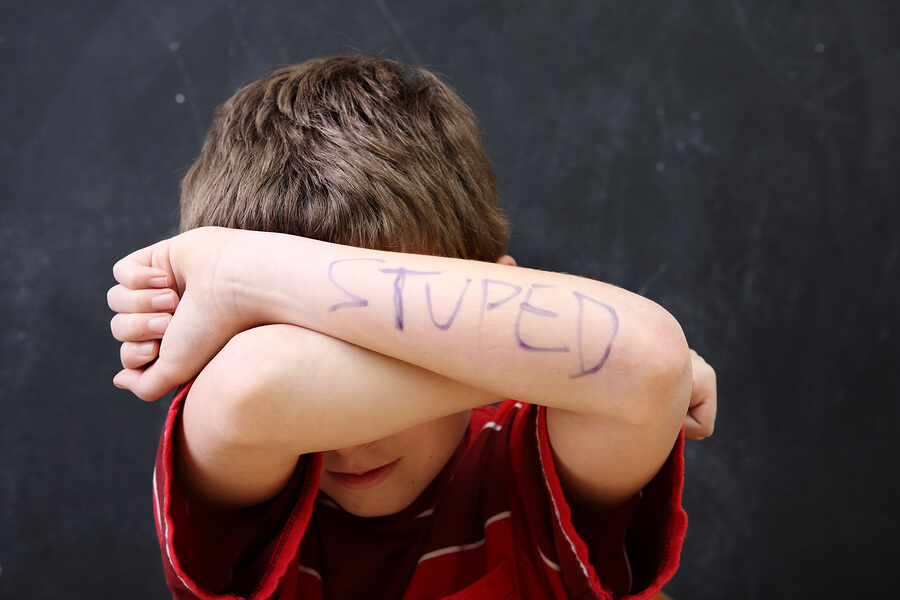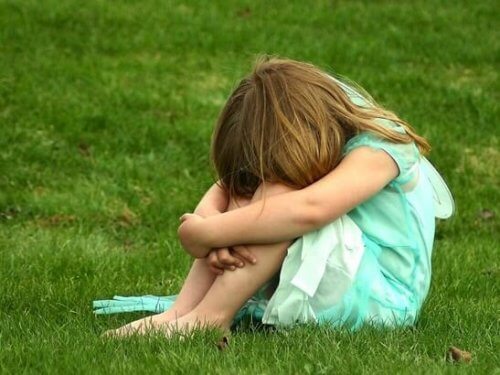3 Potential Problems with Self-Esteem in Children

Problems with self-esteem in children should be closely monitored by parents. This is because, in many ways, their future well-being depends on it. The best way to determine if they have any type of self-esteem issue is to keep a close eye on their behavior.
What is self-esteem?
Self-esteem is the value or worth that people give to themselves. It’s an essential part of children’s development. Through it, they can feel acceptance, love and self-worth in all the relationships they have with those around them. In other words, it’s the link between the child’s personality and his or her surroundings.
Importance of self-esteem in children
A healthy self-esteem is important at any age, but especially during childhood. A good self-esteem will ensure children’s healthy development. It also stimulates learning processes.
This can help them create good relationships with those around them, and enables them to experience happiness. Children with a stable self-esteem are assured, competent, feel valuable and are an active part of society.
On the other hand, children with low self-esteem can become critical and timid individuals. Unfortunately, these attitudes can lead to them becoming aggressive. This, in turn, makes it difficult for them to adapt to their environment.
3 frequent problems with self-esteem in children
The impression that people have of themselves can provoke problems with self-esteem. As it is such a variable condition, and influenced by external factors, it can cause very visible behavioral changes.
Experts point to at least three types of problems with self-esteem in children:
1. Exaggerated self-esteem
This is also known as false self-esteem and isn’t healthy for those who show this type of behavior. Children with this attitude tend to be cocky and demand things because they think they’re always right and deserve it. On top of this, they feel the need to demonstrate their achievements and qualities to those around them, in order to gain recognition.

In general, this condition occurs when children don’t receive attention, praise or love from their parents.
This lack of love leads them, subconsciously, to exaggerate the image they project to others in order to be accepted and receive attention. When their parents don’t impose limits or boundaries, then they simply believe that they’re right and are worthy of other people’s admiration.
“In children, a healthy self-esteem stimulates learning processes, which creates good relationships with those around them, and allows them to achieve happiness”
2. Constant low self-esteem in children
This is one of the problems of self-esteem in children that most parents face. These children are known for being individuals that are understated in any circumstance, and don’t respond to positive or negative stimuli.
In general, they tend to be indecisive children. They are afraid of being ridiculed, of failure and don’t stand up for themselves. This problem can appear when they’re affected by the demands of society or even their parents.
When they see they’re unable to live up to what is expected of them, they stop trying. With the passing of time, they become pessimistic and negative.

3. Low and unstable self-esteem in children
This type of self-esteem is significantly influenced by stimuli from the outside world. When good things happen their self-esteem goes sky high. However, when bad things happen, it plummets again.
It’s difficult to detect self-esteem issues in small children, simply due to the fact that all children are very changeable by nature. However, some of the signs of this problem can be:
- Children who are calm but become irritable when receiving constructive criticism.
- Children who get anxious about situations that require responsibility, for example, a school assignment. This is because they think they won’t be able to do it well.
- Children who fear achievements.
- Children who lie, cheat, become aggressive or turn very shy.
Generally, this problem arises when parents or teachers compare them to other children, or to their siblings. It also occurs when they face bullying, or go through something that causes upheaval or upset in their lives, such as the arrival of another baby in the household.
To sum things up, if parents know about these potential problems of self-esteem in children, it can help them take action before it’s too late.
Family support is essential in order to overcome the hurdles and difficulties that can easily appear at this age. Without a doubt, love, affection and understanding will make all the difference when dealing with these situations, and may even stop them from happening in the first place.
All cited sources were thoroughly reviewed by our team to ensure their quality, reliability, currency, and validity. The bibliography of this article was considered reliable and of academic or scientific accuracy.
- Haeussler, I., & Milicic, N. (1995). Confiar en uno mismo: Programa de desarrollo de la autoestima. Editorial Catalonia.
- Niebla, J. C., & Hernández-Guzmán, L. (2001). ¿ Son Contextos Socio-ambientales los que Definen las Dimensiones de la Autoestima en Niños y Adolescentes?. Revista Mexicana de Psicología, 18(2), 229-237. https://www.researchgate.net/profile/Joaquin_Niebla/publication/288269769_Are_self-esteem_dimensions_defined_by_socio-environmental_contexts_in_children_and_adolescents/links/5b159512aca272d43b7e7cab/Are-self-esteem-dimensions-defined-by-socio-environmental-contexts-in-children-and-adolescents.pdf
- Shaffer, D. R., & del Barrio Martínez, C. (2002). Desarrollo social y de la personalidad. Madrid: Thomson.